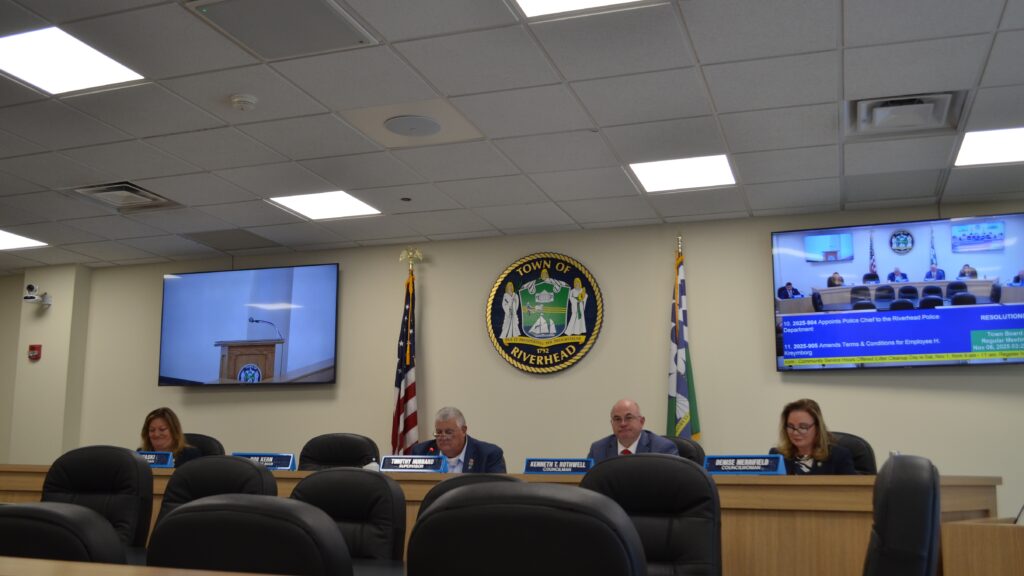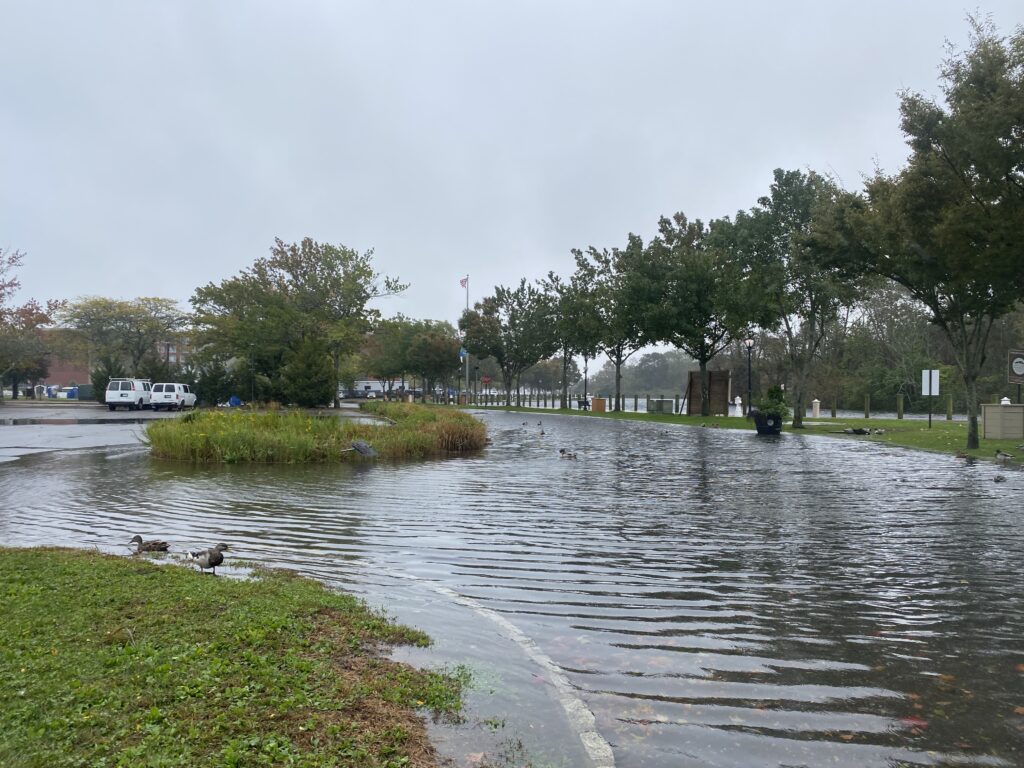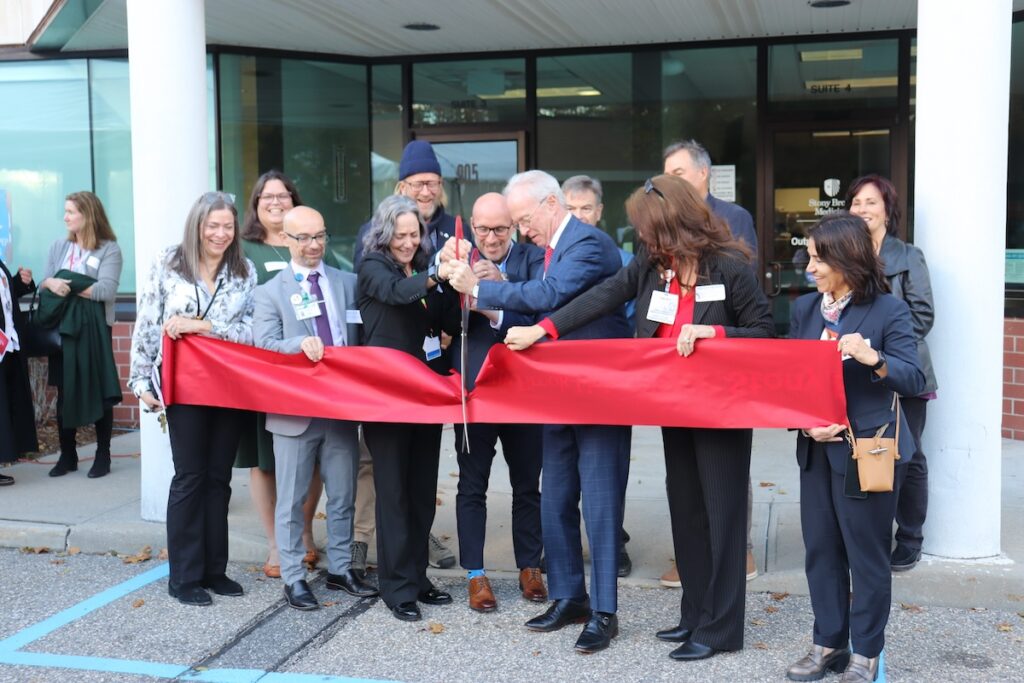Residents push back on tax hikes in prelim 2026 town budget

Riverhead Town residents aired their frustrations over the proposed budget at a public hearing last Thursday — urging officials to slash spending as the town prepares to pierce the state’s tax cap for the fourth straight year.
The town’s preliminary 2026 budget includes a 7.74% tax levy increase for 2026 and a 6.74% town-wide property tax rate hike. The $112 million budget must be approved by Nov. 20.
Deborah Freitag, who moved to South Jamesport from New Jersey in 2021, told the board that her taxes have shot up from $11,000 to $18,000 in the past four years. She said the life she imagined she would have when moving to Riverhead is being “really impacted by the craziness of the tax increases.”
“It feels like [the increases are] solely on the backs of working families and retirees, it’s killing us,” Ms. Freitag said.
The budget exceeds the state’s 2% tax cap by approximately 4.63%, resulting in an increase of approximately $275 per year, or about 75 cents per day, for a home valued at $735,000.
Amid the backlash, Riverhead Town officials stood firm on the decisions made for next year’s budget and stressed there were certain mandated costs out of their control.
That didn’t placate many of those who attended the Nov. 6 hearing.
“Ignoring the taxpayers is disrespectful and costly,” said Claudette Bianco of Baiting Hollow. “People are angry. There are ways to tighten the belt.”
Nancy Murphy of Aquebogue said when she sees her property tax bill, she feels like she is “being punished” for owning a home.
Cindy Clifford, president of the Heart of Riverhead Civic Association, shed light on the rising costs Riverhead residents are facing everywhere, and how these tax increases only add to the “aggravation.”
“If you’ve ever struggled financially, I would ask you to remember how stressful and difficult it is, and if you never have, then try to imagine what it would be like,” Ms. Clifford said to the town board. “I’m asking you to go back to the books, and if you have to sacrifice more here and there, that you do it for the benefit of and for respect for our community.”
Tax rate vs. tax levy: The tax levy is the total dollar amount of property tax revenue a local government needs to collect to fund its operations. The tax rate is the percentage, or rate, applied to a property’s assessed value to determine an individual taxpayer’s bill.
Riverhead Town Supervisor Tim Hubbard and his fellow council members have blamed the increases on unavoidable health insurance premiums, state retirement rates, and contractual police raises that would have otherwise forced elimination of nearly 15 town positions.
To minimize the tax cap breach, town officials denied all merit raise requests and added no new positions for 2026. The only salary increases approved were for civil service promotions and a 3.25% raise for elected officials excluding town board members, matching contractual increases for CSEA employees.
Mr. Hubbard also previously noted reductions of $319,009 in equipment and $216,000 in vehicle expenditures.
“We’ve increased fees, we’ve increased permit lines, we’ve increased everything we can to try to offset it,” Mr. Hubbard said. “We have done that to raise revenue, but that is a mere pittance in a $112 [million] budget when we get hit with a double-digit increase for health insurance for 350 employees — that’s hard.”
Mr. Hubbard said the town board is looking into how a reassessment could help. The town has not undergone a municipal reassessment since 1980, according to the New York State Department of Taxation and Finance.
Jeanette DiPaola, the town’s financial administrator, cleared up some other misconceptions of the budget during the hearing. She said the tax cap is solely exceeded in the general fund and is increasing by $1.9 million next year.
In her complaints about the rising tax bills, Ms. Bianco questioned the amount within the town’s fund balance and felt these funds should have been used to offset the tax increase. The preliminary budget designated $1.25 million in fund balance for the general fund.
Ms. DiPaola said how critical it is for the town to save for future capital projects, such as the Town Square development. Although the town has received a $23 million RAISE grant from the state for the project, Riverhead is required to contribute $7 million.
She added in 2020, the fund balance was approximately 17%, which is just above the town’s 15% minimum. Over the years, the town has tried to budget conservatively to build this fund balance back up, but the extra revenues makes it difficult to not pierce the tax cap.
“I’m saving that so that we can pay the general fund money out for those kinds of things, instead of having to increase the debt, year over year, for the next five years coming,” Ms. DiPaola said. “We are just trying to be smart about how we apply fund balance — we tried not to balance our operating budget with fund balance money.”
What is a fund balance? The fund balance is the total accumulation of operating surpluses and deficits since the beginning of a local government’s existence, according to the state comptroller’s office.
Spending on the Riverhead Police Department is where a majority of the increases in the 2026 budget lie, Ms. DiPaola said. The total police department budget for 2026 is nearly $35 million, roughly a $3.1 million bump from this year.
“We love our police, but it’s very costly to have a police department,” Ms. DiPaola said. “As the supervisor mentioned, he doesn’t want to cut back on public safety. I don’t think the residents would want that either.”
Councilman Kenneth Rothwell reminded residents they pay lower county taxes by having their own police force, since Riverhead does not rely on Suffolk County Police for law enforcement within the town. He also pointed to a report that crime statistics are down in Riverhead and how an increased police force creates safer communities.
Councilwoman Denise Merrifield felt faster response times and better presence in the community are some of the benefits of having a local police department. She also emphasized the importance of offering competitive salaries to police officers.
“In order to keep good police officers, you need to pay them well — you don’t want the bottom of the barrel,” Ms. Merrifield said. “These are things that are hard to measure by dollars and cents, but it’s what you get when you have your own police department.”
The written comment period on the 2026 preliminary budget is open until Nov. 16.









